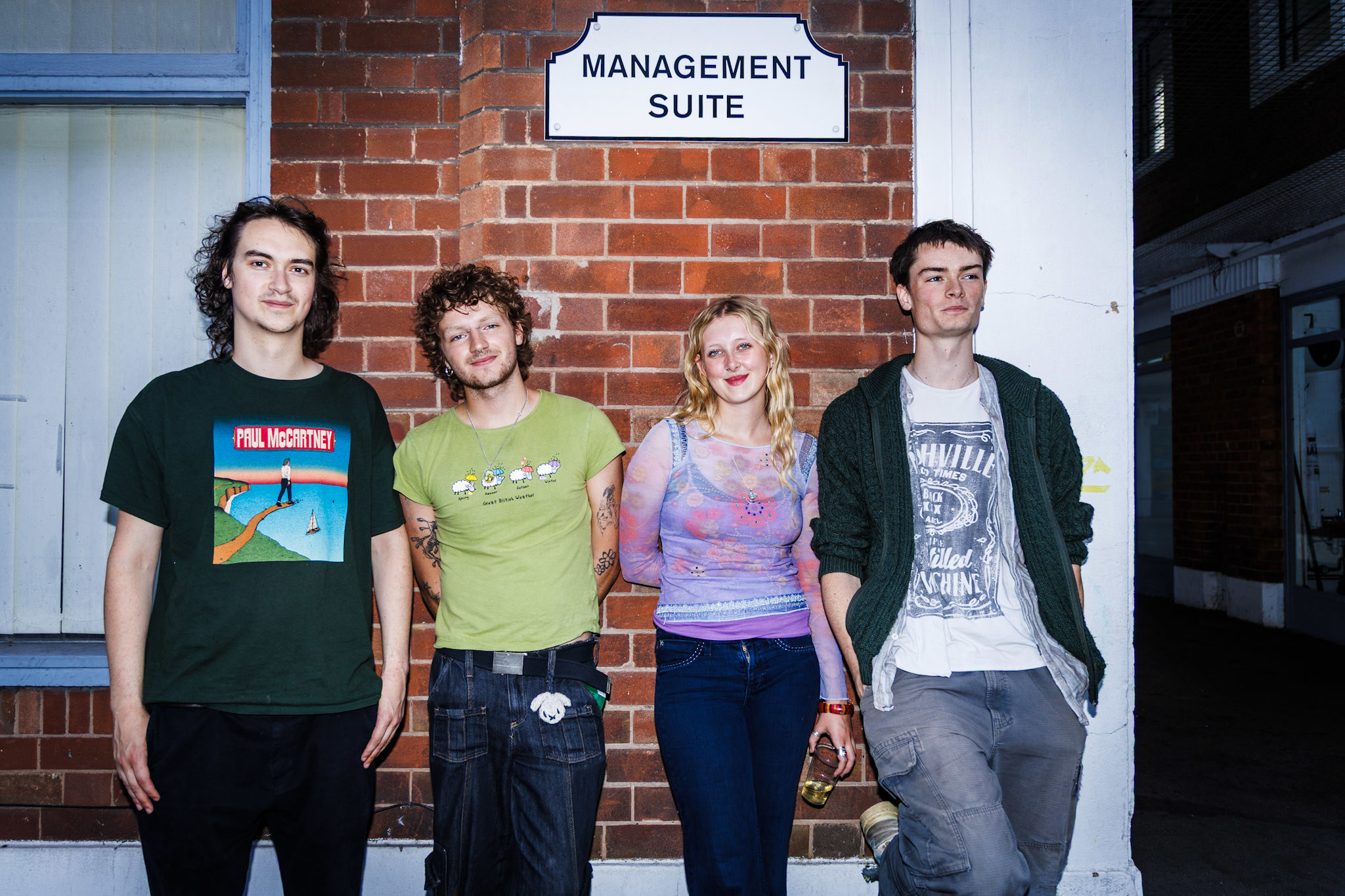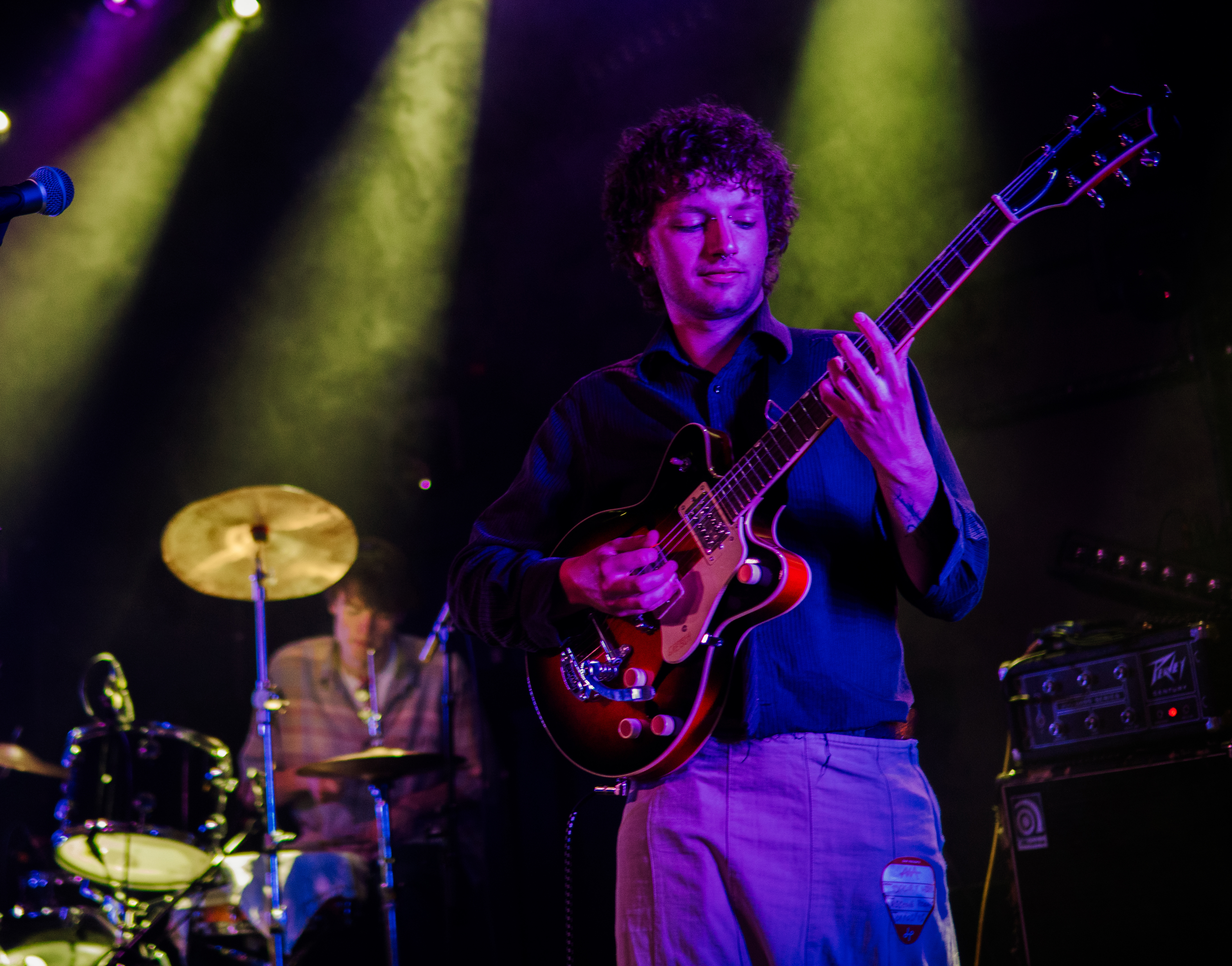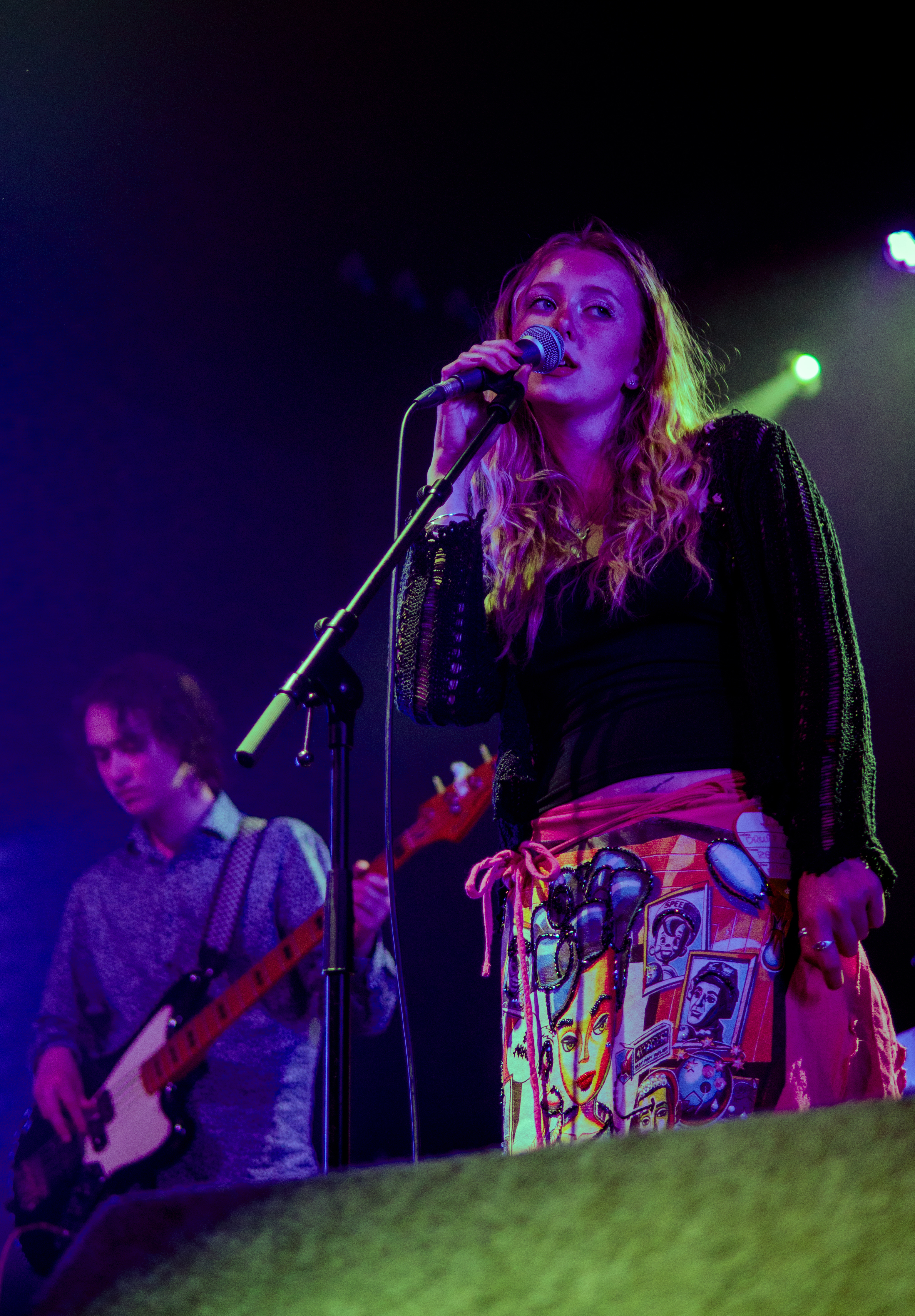Nottingham born-and-bred Drury Hill are one of the emerging bands repopulating the local grassroots music scene with a softer rock, post-folk influenced sound. Transitioning between softly lilting, storytelling tracks and jangly, spirited choruses you find yourself humming days afterwards, the four-piece’s live gigs and recent EP Fields capture a fittingly self-described "soft rockin’, slacker poppin’’ voice. But their DIY, offbeat and grassroots ethos runs deeper than their distinct sound; Drury Hill have always been shaped by the band members’ shared adolescence in Nottingham. We met with Charley to talk about the ways a sense of place seeps into their songwriting, the nostalgia that infuses Fields, and the support of the grassroots music scene...

Made up of Lois, Charley, and brothers Alfie and Solly, Drury Hill began – in true slacker pop style – on Charley’s bedroom floor, with only an acoustic guitar between them. ‘We met in college,’ Charley tells me. A shared obsession with Mazzy Star had been at the forefront of their then-songwriting, captured in hundreds of hours of voice recordings and gradually honed during small gigs at local venues. Over a year later, and with their first EP two months old, Drury Hill’s sound is one encompassing post-folk influences such as Big Thief and Tapir!, alongside soft rock and lo-fi sounds from the likes of Pavement. Sundays-esque lyrics and shimmery, dream-pop guitar riffs surface in Fly Song; the storytelling quality of Fifty Years is reminiscent of classic tunesmiths like The Beatles.
"I’m personally most influenced by whatever’s most current," Charley tells me. "I really like what’s happening right now, it’s most exciting. But I also think genre’s becoming a lot less important – a lot more slippery."
That Fields feels as fully fleshed out, self-contained and yet ranging over its five tracks as an album is testament to Drury Hill’s sophisticated songwriting, which explores and synthesises these influences around a distinct voice. The EP is saturated in nostalgic images of place: small vignettes of suburban and distinctly British-feeling life, relatable enough to resonate through listeners’ own lives. It’s a nostalgia toeing a precisely balanced line, Lois’ gold-toned and often dreamlike vocals paired with rich orchestration, and offset with a sense of humour distinct to the band’s generation.
"We write a lot about us in our younger form," Charley says; a collective adolescence unfolding into young adulthood through mundane moments spent in waiting rooms in Fifty Years, walking home from work in Rocks, looking for existential answers from bugs upside-down on kitchen floors in Fly Song/The History of Time.
"Because we’ve all grown up in Nottingham, we all have similar experiences which we'll cling onto with such a similar memory. The song will build up around that...I do think there’s a lot of nostalgia involved."
At points, this coalesces a little more explicitly. The band’s name is a fitting example.
"That was a big Solly and Alfie moment,"Charley explains. "They’ve both got a strong footing in family and heritage, and of Nottingham being important to us as a band. Drury Hill was a street that was a core place for culture and community, but was knocked down and destroyed for Broadmarsh – which now doesn’t even exist."
Now obscure and ill-remembered in the city’s collective discourses, the name Drury Hill offers a symbolic nod to heritage, and a point of referencing anchoring it firmly within a sense of origin.
"We still use the original sign of Drury Hill as our font and logo. It’s a way of honouring our place."

I ask Charley how Nottingham’s current cultural and music scene has influenced and supported the band as its developed over the last year.
"I feel very grateful for the creative space that has been formed," they tell me earnestly. ‘There’s stuff happening all the time, and it’s all independent – friends supporting friends."
For a while, Charley explains, the music scene felt dominated by similar punk and heavy sludge-rock genres.
"I think we felt hesitant for a while – just dipping our toes in – but people have been very welcoming. Now, there’s an active scene of new folk rock, a softer kind of thing happening. Davoli, Jmaes for example."
As well as bands like Pict, Estella and Possum Kid, venues such as The Grove have been incredibly supportive.
"They opened a year ago, and have just made the scene so much more vibrant and welcoming. It’s run by lovely people, always giving new bands a shout, always active doing things and working on mutual benefit and trust." The Grove has hosted Drury Hill’s EP recording, release show and a good ten gigs.
Drury Hill’s attitude to songwriting, music production and their fanbase also remains firmly grounded in a grassroots ethos.
"Something I really want to pursue is getting creative with every aspect of it, keeping that DIY feel," Charley reflects. "I would never describe Solly as a drummer or Alfie as a bassist, I would describe them as musicians and artists in all different ways. And I hope that comes across in the band…a wider creative image." I recall my own CD copy of Fields: a handmade card-and-masking-tape case, the title and track-list written on in white pen, a little ‘No.4’ in the corner marking it as one of a small run of copies.
Drury Hill’s enthusiasm for a cross-pollinating, indiscriminating creative practice makes it unsurprising that authenticity and character is essential to the band and their music.
"We’ve tried to make it a whole choreography of having ourselves across everything. When I think of artists I like, for example Cameron Winter, he’s just the most ridiculous person on the internet right now." Their own social media presence is equally saturated with the same offbeat humour that offsets the nostalgia in their songs – hints of inside jokes, comically bad pictures of band members and captions you can’t quite tell are taking the piss or not.
"As soon as the song’s out there, as soon as someone else is listening to it, it’s not yours anymore, you have no power over it."
This an important balance for their music too. Few track titles as obviously convey the double-pronged themes of unseriousness and depth as Fly Song/The History of Time. Horse Face Karaoke takes the surrealist character-building further, Lois singing as if from the perspective of a horse through lines like "watching Spirit on DVD / my Dad’s an extra" and "lazy day grazing / dreaming of racing". At points starry-eyed in a slightly wistful, slightly playful way, the brand of humour Drury Hill deploys is soaked in cultural references – like the oft-cited Dreamworks film, Spirit – through which a sense of generation-defined character is subtly diffused. Importantly, this sense of character is unmarred by didacticism.
"You can’t really decide what your song is about," Charley reflects, when I ask if these metaphors are supposed to be unpicked. "As soon as the song’s out there, as soon as someone else is listening to it, it’s not yours anymore, you have no power over it. And if you try to have power over it, people aren’t going to feel anything."
A similar set of principles is reflected in the band’s choice not to put Fields on Spotify, but make it available only on Bandcamp or in physical CD format.
"It was a decision made the day before," Charley says. ‘Obviously Spotify sucks as a company, but it’s half strategy...it’s kind of nice the EP just being for our friends and people we know right now. It feels quite private and DIY and almost like a secret little thing." A bit of band lore, we joke. More seriously, it’s also a small rebellion against the lack of ownership and revenue rights that platforms like Spotify contribute to and profit from, and a mark of faith in the grassroots music community.
With equal parts ambition and a firmly grassroots identity, it’s clear that while Fields has been a project they’re all proud of, no time is being wasted on what’s next. Drury Hill have recently been taken on board by Strap Originals, who’ve been helping secure headline, support and festival shows across Nottingham, Newcastle and London. Some recording is booked in soon for what will hopefully shape up to be a six-song EP.
"We’d love to do an album, definitely in the future," Charley tells me hopefully.
Most enduringly, Fields is of an intimately human scale: populated with playful characters, framed by kitchen floors, waiting rooms and rocks stuck in shoes, and saturated in resonant images of place. In many ways, Drury Hill are of their time: a young generation looking (not without anxiety) to the future, yet shaped indelibly by a past and place ringing with nostalgia. But it’s also music that is closely reflective of the grassroots scene they’ve come from, with values to match.
Band portrait: Nigel King / Live photos: Violet McCreedy

We have a favour to ask
LeftLion is Nottingham’s meeting point for information about what’s going on in our city, from the established organisations to the grassroots. We want to keep what we do free to all to access, but increasingly we are relying on revenue from our readers to continue. Can you spare a few quid each month to support us?




